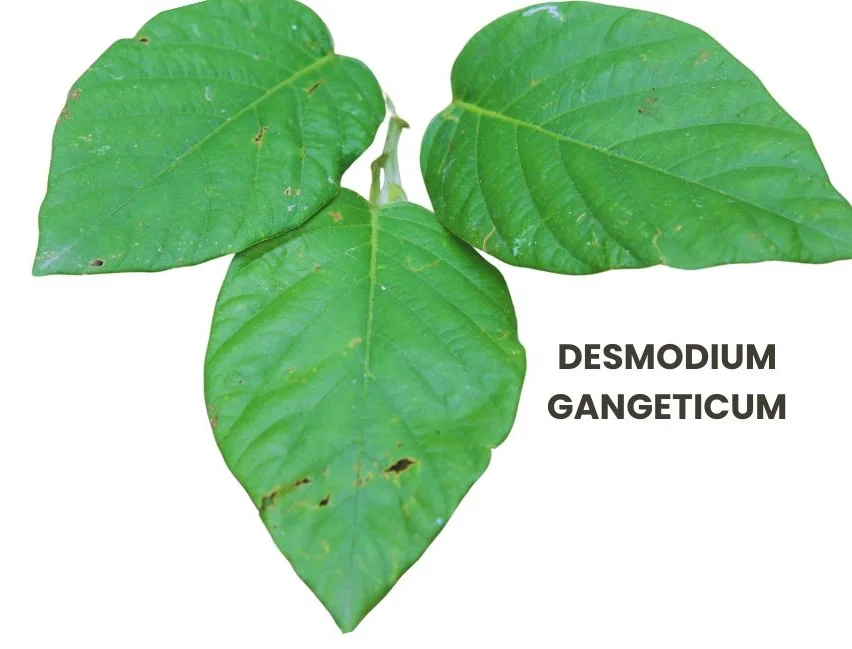Desmodium Gangeticum, commonly known as Shalpani, is a medicinal plant with significant therapeutic properties, especially in treating fevers, headaches, and meningitis.

SOURCE INFORMATION
Scientific Classification
- Kingdom: Plantae
- Clade: Angiosperms
- Clade: Eudicots
- Order: Fabales
- Family: Fabaceae (Leguminosae)
- Genus: Desmodium
- Species: D. gangeticum
Origin
- Desmodium Gangeticum, commonly known as Shalpani or Salaparni, is native to the Indian subcontinent and Southeast Asia.
- It grows widely in tropical and subtropical regions, flourishing in a variety of habitats from grasslands to forest edges.
Historical Facts
- Traditional Medicine: This plant has been used for centuries in Ayurveda, Siddha, and other traditional medicinal systems in India.
- It is revered for its therapeutic properties, particularly in treating febrile conditions, respiratory ailments, and nervous disorders.
- Ayurvedic Significance: In Ayurveda, Desmodium Gangeticum is classified as a Rasayana herb, which means it is considered to promote longevity, rejuvenation, and overall health.
- It is often included in formulations aimed at boosting immunity and vitality.
Historical Usage
- Ancient Texts: Desmodium Gangeticum is mentioned in several ancient Indian texts, including the Charaka Samhita and Sushruta Samhita, as an important medicinal plant.
- Ethnobotanical Applications: Traditionally, it has been used by various indigenous communities for its antipyretic (fever-reducing), anti-inflammatory, and analgesic (pain-relieving) properties.
Pharmacological Properties
- Anti-inflammatory: Reduces inflammation in various conditions, including arthritis and other inflammatory diseases.
- Antipyretic: Effective in lowering fever.
- Analgesic: Provides pain relief, especially in neuralgic conditions.
- Nervine Tonic: Strengthens and calms the nervous system.
- Immunomodulatory: Boosts the immune system, enhancing the body’s ability to fight infections.
CLINICAL APPLICATIONS
- Fever: Effective in treating various types of fever, especially intermittent and remittent fevers.
- Headache: Relieves headaches associated with meningitis and neuralgia.
- Meningitis: Used in the treatment of cerebro-spinal meningitis.
- Neuralgia: Alleviates sharp nerve pain throughout the body.
KEY CHARACTERISTICS
- Febrifuge: Reduces fever.
- Analgesic: Relieves pain.
- Anti-inflammatory: Reduces inflammation.
- Nervine: Calms the nervous system.
DETAILED ORGAN SYMPTOMS
HEAD
- Cerebro-spinal Meningitis: Inflammation of the brain and spinal cord membranes, causing severe headache and stiffness.
- Headache: Sensation as if the head is bound tightly with a tape, often associated with meningitis.
PAIN
- Neuralgic Pain: Sharp, shocking pain that follows the path of a nerve.
- Spinal Pain: Intense pain along the spine, making it difficult to sit straight.
- Burning Sensation: In hands and feet, often accompanied by hot flushes in the face.
SENSORIUM
- Sleeplessness: Difficulty in sleeping.
- Comatose Sleep: Deep, unconscious sleep.
FEVER
- Intermittent or Remittent Fever: Fever that comes and goes or fluctuates.
- Symptoms: Fever typically occurs at 7 A.M. with a slight chill, lasting for 2-3 hours. It includes burning sensations, hot flushes from the face, and remission of fever with perspiration.
POTENCY OF CHOICE
- Mother Tincture: Used for acute conditions.
- Potencies: 3x, 6x, 30 are used for chronic conditions and specific symptoms.
Frequently Asked Questions
What conditions can Desmodium Gangeticum treat?
- Desmodium Gangeticum is used for treating fevers, headaches, meningitis, neuralgic pain, and inflammation.
How does Desmodium Gangeticum help with fever?
- It acts as a febrifuge, reducing fever and alleviating associated symptoms like chills, burning sensations, and hot flushes.
What is the recommended dosage for acute meningitis?
- For acute meningitis, the mother tincture is recommended.
- For chronic conditions, potencies of 3x, 6x, and 30 are effective.
Are there any side effects of using Desmodium Gangeticum?
- Generally, it is well-tolerated, but overuse may cause gastrointestinal disturbances or allergic reactions in some individuals.
Glossary of Difficult Words
- Cerebro-spinal Meningitis: Inflammation of the brain and spinal cord membranes.
- Febrifuge: A substance that reduces fever.
- Analgesic: A substance that relieves pain.
- Neuralgia: Sharp, shooting pain along a nerve.
- Nervine: A substance that calms the nervous system.
- Comatose Sleep: A state of deep, unconscious sleep.
This detailed overview of Desmodium Gangeticum provides comprehensive information on its medicinal properties, therapeutic applications, and recommended usage.
If you have any further questions or need additional details, feel free to ask!
